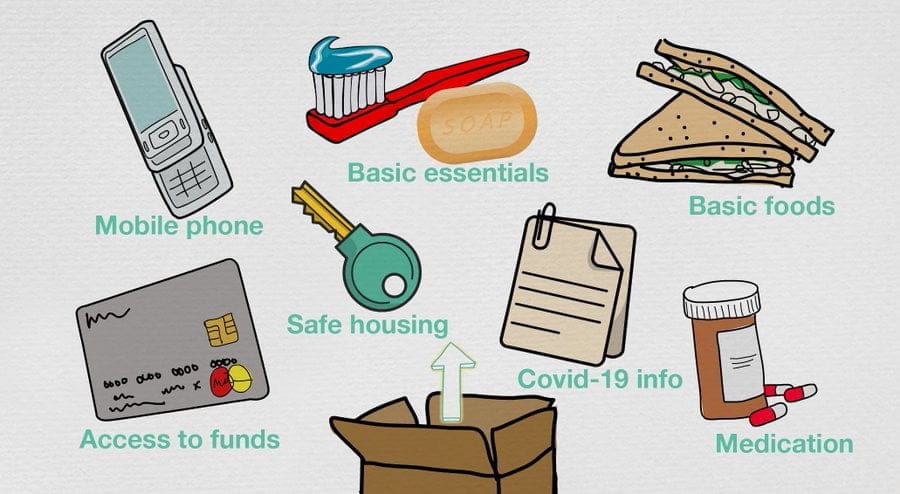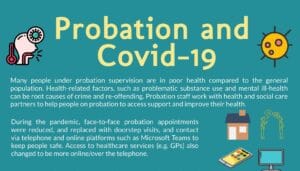What can we take forward post-lockdown?
This is the seventh in a new blog series chronicling the different ways in which organisations in the criminal justice sector are helping their service users survive the impact of coronavirus. It is written by Helen Berresford and Caroline Drummond from Nacro.
If your organisation – statutory, voluntary, or private – would like to share how you’ve had to adapt to be able to continue to provide your service, please get in touch.
It goes without saying that lockdown has radically changed how Nacro can deliver support to people we work with. As an organisation that delivers services to support some of the most vulnerable in society through education, housing and prison resettlement, COVID-19 has forced us, like many others, to flex and adapt at a lightening pace. Our immediate focus was on how we could adapt our delivery to best meet the ongoing needs of the people we support whilst protecting the health of service users and staff. All of our teams who work inside prisons were moved out almost overnight and our community teams were no longer able to provide face to face support. But as the pandemic had been unfolding, we had been preparing.
Now six weeks into lockdown, having established our different ways of working, we are also reflecting on what we have learnt which we can take forward in a post-lockdown world. As one of our team put it:
“It’s almost as though Coronavirus has actually brought us all closer together and as a result of this, we have jointly created new working practices.”
Prison release can be very stressful
For people who don’t work in this space, there is often an assumption that release from prison is an overwhelmingly positive time for people. But of course it’s far more complicated than that and for many it can cause huge amounts of anxiety. With the world outside the prison gate looking so different now, we know that we have to do everything we can to reduce the anxiety and stress people face and ease their transition.
One critical thing our custody resettlement teams, now based at home, started to do early on was to create release packs. These contain key information about where someone is being released to, what they now need to do, who to contact and, crucially, information about COVID-19 and what this actually means for being in the community. But we are hugely reliant on stretched prison staff to make sure people receive these, so building up and maintaining effective relationships with the prisons has been really important in trying to make sure people get what they need on release.
Requesting 12 week discharge lists so we can still plan in advance and work with probation colleagues has also been incredibly helpful in making sure the basics are in place on release. The biggest challenge for these teams is that they can no longer communicate with people in prison in the way they did. The information they would have picked up from a conversation is no longer available to them in the same way. But they now do everything they can remotely with the information they have – making housing applications, applying for ID, sorting out financial problems etc. It’s far from perfect but they have been innovative and have come up with new ways of doing things.
The animation below provides an insight into the essential components of a successful release from prison.
Remote support
Over in our community based teams, our staff continue to provide all of the support they did before but have switched to regular phone calls instead of face to face interaction. They have increased how much they call to ‘check in’; maintaining relationships and just making sure people know that the support is still there even if it isn’t face to face. As is the same for most of us, regular communication and checking in is so critical in getting through the long days.
More effective partnership working, as well rehearsed a phrase as it is, has been a theme across our delivery. We have seen some really great examples of our relationships with partners growing even stronger, particularly around ensuring that claims for Universal Credit are processed as quickly as possible and problems are overcome. Our staff based in South Yorkshire, for example, have now got such a productive partnership with staff at Sheffield JobCentre they have not needed to use the national DWP UC helpline.
“Together we have all found a new way of working where we can provide as good a service as we possibly can.”
Resettlement advice
In Our Resettlement Advice Service we have seen a huge shift in enquiries, not just the type of enquiry but also where people are calling from. Pre COVID-19, only a small percentage of our calls were from people in custody but now this is over 60%. Colleagues on the helpline find themselves having to answer a completely different set of questions; ‘do I need to self isolate from my partner on release, how will I access methadone injections, am I eligible for early release?’ Every day brings a new set of challenging questions that we could never have anticipated even a few months ago. But the team have adapted incredibly well, regularly solving a new set of problems and sharing knowledge.
Despite the seismic change in most of our service delivery, one thing that has stayed consistent is our focus on using the experiences of our service users and staff to engage with and influence government to make a bigger difference. Now more than ever, communicating the day to day challenges our service users and staff face is crucial in influencing those at the top. We’ve done this in various ways; by sharing information and examples with Government Ministers in different departments; feeding in our day to day experiences through the Reducing Reoffending Third Sector Advisory Group, giving evidence to the Justice Select Committee and regular communication with officials and MPs about what we are seeing on the ground.
More can be done
We believe a lot more can be done to support people being released from prison, as a minimum providing people with a Release Pack with the essentials and making sure they have somewhere safe to go. And it’s so important that the positive steps brought in to support prison leavers at this time are built on for the long term: keeping the DWP phone line for prison leavers, permanently increasing the discharge grant and providing increased housing support. These will be needed more than ever in a post lockdown world.
We are incredibly proud of how our staff and service users have adapted and been so flexible and resilient during this time. But if we are really honest, our teams can’t wait to restart those face to face conversations again where we build a relationship and trust with people and really learn what they need and how best to support them. But our experiences over the past six weeks have made us think about what can be taken forward in the long term – stronger partnership working, more staff peer support and using our ability to quickly adapt to continually innovate and improve our services for everyone we support. As one colleague put it best:
“During my 7-8 years of working for Nacro, this is my proudest moment”.








